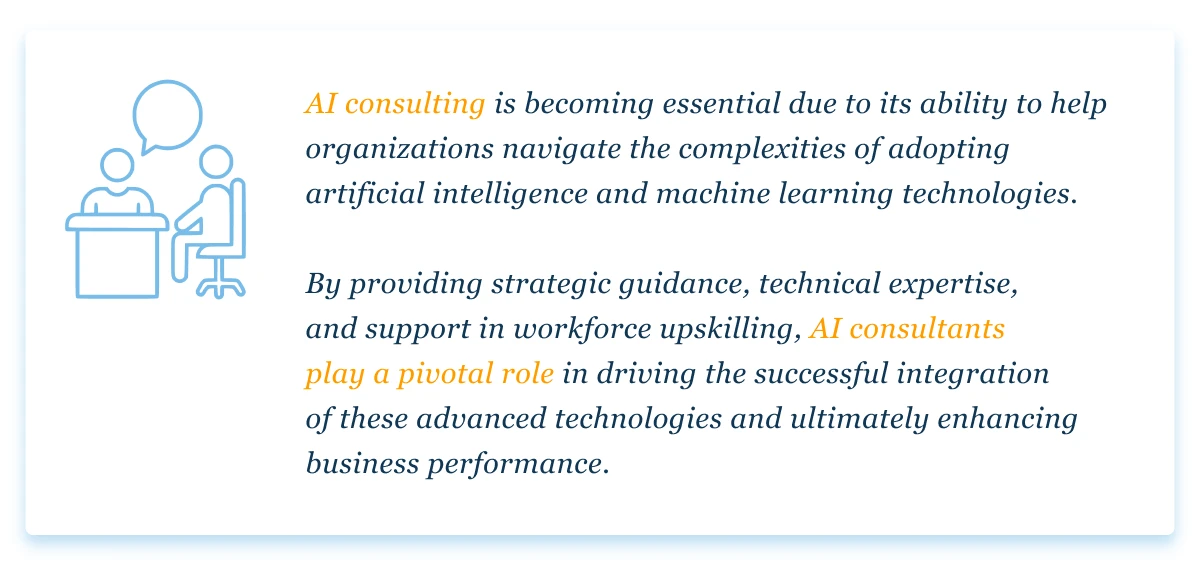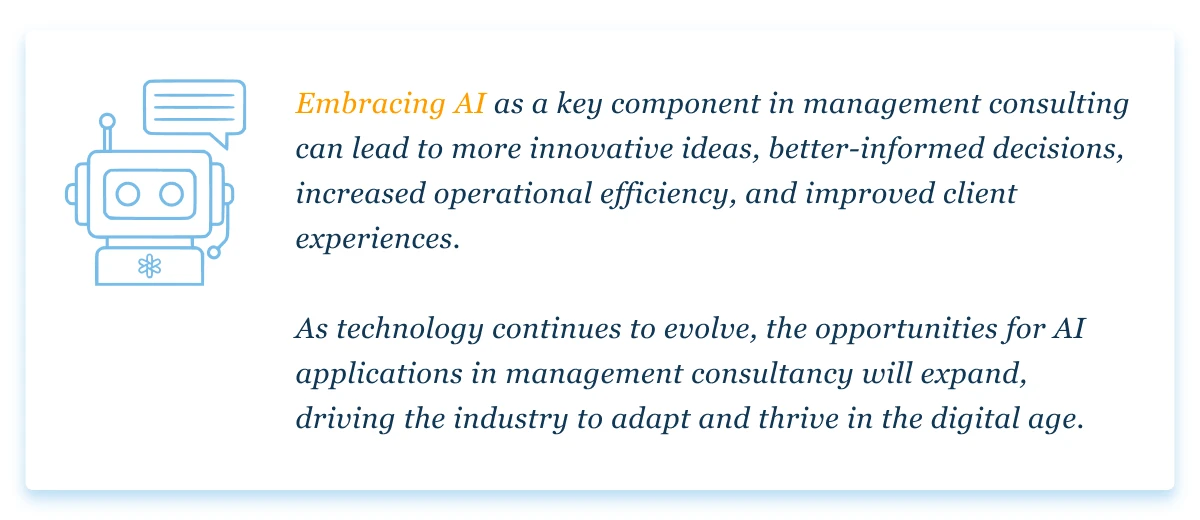Artificial intelligence has become a significant factor in the management consulting industry. Incorporating AI-driven tools and solutions has transformed workflows and decision-making processes, providing enhanced value to businesses. Companies have started to recognize the potential of AI management consulting, as its ability to analyze complex data sets and implement machine learning algorithms results in improved strategic expertise.
One aspect of AI in management consulting is the development of tailored AI strategies. Doing so requires a thorough understanding of the organization’s needs and objectives. In-depth AI strategy consulting provides insights on selecting the appropriate AI technology vendor to align with the company’s goals.
In addition, companies specializing in AI consulting and artificial intelligence solutions help organizations harness the power of machine learning technologies. AI consulting services are crucial for businesses looking to make informed decisions, optimize their operations, and gain a competitive edge in their respective industries.

Source: Unsplash
Furthermore, management consulting and AI form a powerful combination that allows organizations to automate routine tasks and analyze large datasets. By leveraging AI technologies, companies can uncover intricate trends and patterns that would have otherwise gone unnoticed, leading to more informed decision-making and innovative solutions.
As AI continues to evolve and improve, its influence on the management consulting industry will only grow. With the ability to process and analyze massive amounts of data quickly, generate insightful recommendations, and help develop strategic solutions, AI will undoubtedly continue to shape the future of management consulting.
Why is AI consulting becoming important?
Artificial intelligence and machine learning technologies are becoming increasingly important in today’s business world. These innovations could revolutionize management consulting. To improve their overall performance and gain a competitive edge, businesses are looking for guidance on how to leverage these powerful technologies.
AI-driven tools offer immense potential in delivering enhanced insights, automating repetitive tasks, and optimizing business processes. One of the primary reasons for the growing importance of AI consulting is the need for expertise in identifying the most valuable AI initiatives. Businesses need assistance in formulating their AI strategies, understanding the challenges and opportunities they face, and evaluating their data and analytics capabilities to implement AI solutions successfully.
Another factor contributing to the rising importance of AI consulting is the integration of AI technologies with existing systems. Since many organizations lack in-house technical expertise, they often seek the help of AI consultants to ensure seamless implementation and achieve their desired goals faster. This is crucial because effectively integrating AI with current systems can lead to significant improvements in operational efficiency and decision-making processes.
Furthermore, AI consulting is fundamental in educating and upskilling the workforce. Employees must learn new skills and adapt to new technologies as AI continues to change the nature of work. A smooth transition into an AI-driven work environment requires addressing potential disruptions brought on by AI and implementing best practices.

Impact of AI on management consulting
The growth of artificial intelligence has started to shape business consulting in various ways. For instance, AI-driven tools and technologies have been helping consultants provide more accurate and insightful solutions for their clients. Using machine learning algorithms, consultants can analyze large datasets more efficiently, enabling them to make better-informed decisions and offer tailored solutions for their clients’ specific needs.
The rise of AI consultancy has brought numerous benefits to businesses and consultants. AI has improved business growth by using it to analyze data, manage projects, and develop strategic plans. Using AI-driven tools, consultants have improved their capabilities, optimized their workflow, and, ultimately, reduced their workload, resulting in greater value for their clients.
In addition to changing the nature of the interaction between consultants and clients, AI affects management consulting. AI enables consultants to assist small businesses with their consulting needs, democratizing consulting expertise and knowledge. With readily available AI-powered applications, most businesses can take advantage of these benefits without incurring the risks or costs involved in implementing new technologies.
This transformation of management consulting through AI is wider than its tools and processes. As AI develops, we can expect the increasing integration of AI-driven insights and methodologies into consulting services. This will further enhance the effectiveness and efficiency of consultants and ultimately bolster their value to clients. 
By understanding the potential of AI in management consulting, consultants can equip themselves with the right skills and technology to stay relevant and competitive in this ever-evolving landscape. In order to find the right AI consultant, businesses should consider their expertise, track record, and ability to integrate AI capabilities effectively into their existing consulting frameworks. By successfully integrating AI into management consulting, businesses and the consulting industry will all benefit from unprecedented benefits, and the industry will also progress and grow.
AI tools for management consulting
Artificial intelligence has become a game changer in the management consulting industry, offering new solutions and methods for businesses to leverage data and make informed decisions. AI tools help consultants tackle complex problems and deliver more value to their clients. In this section, we will discuss some of the prominent AI tools available for management consulting.
Businesses have increasingly relied on machine learning consulting services as they seek to innovate and experiment with the latest big data technologies. To provide actionable insights to clients, consultants should be able to analyze client data using machine learning algorithms. To achieve growth and success, organizations use these consulting services to explore new strategies and better utilize their data.
An important aspect of utilizing AI in management consulting is developing a practical artificial intelligence strategy for businesses. Automation of repetitive tasks, improved decision-making processes, and data-driven insights are some of the ways AI-driven tools assist companies in transforming operations. Consultants can work with organizations to develop AI implementation strategies tailored to their individual needs, ensuring that AI tools are integrated smoothly and enhancing the organization’s competitive advantage.
Customer relationship management (CRM), natural language processing (NLP), and data analytics are a few applications of artificial intelligence in management consulting. CRM tools powered by AI, such as Salesforce Einstein, help consultants manage and analyze customer data more efficiently. NLP tools, on the other hand, enable consultants to understand client communication and sentiment better, leading to improved customer experiences.
For businesses, AI tools can enhance their operational efficiency by improving their insights, making smarter decisions, and making better decisions overall. Management consultants can help their clients achieve tremendous success by using AI to provide more value to them.
AI vs traditional management consulting
Across many industries, artificial intelligence has changed the game, including management consulting. Through the evolution of machine learning algorithms, business problems that once required highly skilled consultants can now be solved by machine learning algorithms. Artificial intelligence is being debated as a potential replacement for management consultants as a result.
An important advantage of AI in management consulting is its ability to process large volumes of data and derive insights much faster than human consultants. Artificial intelligence-powered platforms can deliver more accurate and data-driven recommendations, resulting in better business outcomes. Using AI in this way can help companies identify new revenue streams or optimize their operations in an efficient and effective manner, for example.

Source: Unsplash
While AI does not yet have the ability to replicate human qualities such as creativity, empathy, and nuanced understanding of unique business scenarios, traditional management consultants do. A consultant can then tailor and cater a business strategy to a client’s cultural, political, and social needs, considering all aspects of the business.
Moreover, the role of management consultants often extends beyond providing insights. They act as trusted advisors to business leaders, facilitating the implementation of strategic recommendations and guiding organizational change. Although AI can offer valuable data-driven insights, it currently needs to influence human behavior and navigate the complexities of organizational dynamics more effectively than seasoned consultants.
Nevertheless, integrating AI into the management consulting industry can be viewed as complementary, rather than competitive, to existing consulting services. Incorporating AI into their work can enable consultants to focus more on strategic decision-making and high-level advisory roles while leaving the tedious data analysis tasks to the AI-powered systems.
Although AI is becoming increasingly sophisticated and powerful, it is unlikely to replace management consultants completely. Instead, AI is more likely to augment and enhance the consulting practice by providing valuable data-driven insights and assisting in time-consuming analytical tasks. The successful consultants of the future will be those who effectively integrate AI capabilities into their service offerings and leverage the unique combination of human and AI-driven insights to drive improved business outcomes.
AI in business management
A number of aspects of business have been transformed by artificial intelligence, including management. One key area where AI has been instrumental is business management, by enabling companies to streamline operations, enhance decision-making processes, and improve productivity. AI-driven solutions are transforming traditional management practices through machine learning algorithms and advanced data analytics.
Management artificial intelligence systems have been developed due to AI integration in business management. These can automate routine tasks, analyze complex data, and even provide managers with recommendations for better decision-making. In addition to their ability to learn from historical data, these cutting-edge tools also adjust their performance in real-time as a result of real-time inputs. By focusing on higher-level tasks that require intuition and creativity, management strategies become more proactive and targeted.

Source: Unsplash
Generative AI, a form of artificial intelligence that can create new data, such as images, text, or music, has gained traction recently. Organizations use this technology to identify previously unseen patterns and trends, allowing those organizations to stay ahead of the competition with strategic decisions. AI continues to disrupt the landscape of business management, from streamlining operations to informing strategic decisions. By harnessing the power of AI, businesses can optimize management processes, react swiftly to changes, and unlock their full potential.
AI applications in management
Artificial intelligence (AI) is transforming the management consulting industry, offering immense potential for delivering enhanced value to clients. The application of artificial intelligence in management encompasses a range of techniques and tools powered by machine learning algorithms. One significant AI application in management consulting is idea generation. Generative AI serves as a wellspring of innovation, generating ideas for products, services, and strategies. This approach is instrumental when exploring potential growth opportunities, business model innovations, or process improvements.
Data-driven decision-making is another vital use of AI in management consulting. The current business environment generates an enormous amount of data, and artificial intelligence can assist in identifying patterns, trends, and opportunities that may not be immediately apparent. An AI-driven analytics approach can inform better strategies, making more informed and data-supported decisions.
AI can be utilized for the automation and optimization of various tasks within management consulting. For example, AI-enabled project management tools can help streamline workflows, allocate resources efficiently, and forecast project timelines more accurately. This ensures more effective resource management, reducing costs and supporting overall business growth.
Furthermore, AI can enhance client interactions by personalizing communication, presentation, and content delivery. AI-driven tools can analyze clients’ preferences, needs, and goals, offering tailored insights and solutions, resulting in a more engaging and valuable consulting experience.
Finally, AI has the potential to empower independent consultants by providing access to powerful analytical tools and insights that were previously only available to larger firms. This democratization of knowledge and technology allows independent consultants to compete more effectively, creating more opportunities and shaping the consulting industry landscape.

Artificial intelligence vs. human intelligence in management consulting
Artificial Intelligence (AI) has made significant strides in various industries, and management consulting is no exception. Integrating AI in management consulting has led to innovative solutions and a path forward that can potentially reshape the industry. One of the main advantages of AI in management consulting is its ability to utilize machine learning algorithms to analyze vast amounts of data efficiently. This helps identify patterns, trends, and insights that human consultants may have overlooked. Moreover, AI-driven tools can provide immense value by spotting outliers and unusual situations faster, allowing businesses to adapt and respond effectively.
On the other hand, human intelligence still plays a significant role in management consulting. Despite AI’s growing prominence, the expertise, creativity, and interpersonal skills of human consultants remain crucial. They can read between the lines, understand nuances, and empathize with clients’ needs – something AI systems have not yet mastered.
Combining the strengths of AI and human consultants can lead to a more practical approach. For instance, AI can be employed for data-driven projects, while humans can offer their domain expertise and soft skills for tasks that require a more nuanced perspective.
In summary, while AI has an undeniable potential to revolutionize the landscape of management consulting, human expertise and capabilities still hold their ground. The future of management consulting with artificial intelligence likely lies in leveraging the best of both worlds to deliver efficient and optimal solutions for clients.
What is the future of consulting in 2024?
Management consulting is an industry that never stands still, and in 2024, AI will play an increasingly significant role. With a revenue of over $10 billion, McKinsey has already experienced several disruptions since its inception. AI and machine learning algorithms are transforming the industry in 2024 with their latest disruption.
Automation of mundane tasks through AI-driven technologies is one of the driving forces behind this transformation. This allows consultants to focus more on strategic thinking and building client relationships while automating repetitive work such as data analysis and report generation. By doing so, consultants can offer their clients deeper insights and more efficient services.
Digitalization and technological solutions are also contributing factors to this change. Many industries increasingly rely on AI and digital tools to enhance their business performance. Management consultants can take advantage of this and assist their clients in navigating the digital landscape by implementing such technologies.

Source: Unsplash
Even with the growing influence of AI, it’s important to remember that human skills still play a vital role in the management consulting industry. AI may excel at tasks requiring data analysis and pattern recognition, but it currently needs more nuanced skills to build meaningful business relationships with people. As a result, human consultants remain essential for effectively leveraging technology to provide tailored solutions that cater to clients’ specific needs.
A significant shift towards AI-driven solutions and digital transformation marks the future of management consulting in 2024. These developments enable consultants to focus on strategic work while automating routine tasks, ultimately delivering improved client results. However, the role of human consultants remains crucial as they bridge the gap between advanced technology and the complexities of interpersonal relationships in the business world.
Will AI take over management consulting?
Management consulting is becoming increasingly dependent on artificial intelligence. By automating repetitive tasks and providing data-driven insights, machine learning algorithms could revolutionize how consultants work. There still needs to be more clarity about how AI will affect management consulting. One perspective is that AI will supercharge independent management consulting by providing tools and support for market research, analytics, and presentation delivery. As a result, consultants may be able to make more informed decisions and be more efficient.
On the other hand, AI may only be able to address some aspects of management consulting. Despite advances in AI technology, it lacks the nuanced skills necessary to build meaningful business relationships with clients, as noted by Consulting Quest. Moreover, the complex and diverse nature of management consulting makes it challenging for AI to replicate the problem-solving capabilities of human consultants fully. Another perspective is that AI will not take over management consulting but will disrupt and reshape the industry. AI-driven tools enhance consultants’ capabilities by providing valuable insights and automating routine tasks. In this scenario, the role of consultants would evolve, with a greater focus on leveraging AI-powered solutions and interpersonal skills to serve clients better.
AI will make a major impact on the management consulting industry. The technology won’t dominate the field completely, but it will change the way consultants work and the way they provide value to clients. For maximum benefits, human consultants must employ and advance through the use of AI.
Conclusion
Artificial intelligence has undoubtedly made a significant impact on the management consulting industry. The integration of AI-driven tools and machine learning algorithms has the potential to transform traditional consulting methods, enhancing the value delivered to clients.
With businesses seeking to optimize their operations and strategies, adopting AI in management consulting has become essential. Consultancies that embrace AI technologies can offer more efficient and data-driven solutions, all while maintaining a client-centric approach. As the industry continues to evolve, the integration of AI and data science within new business models will be of strategic importance. Consultancies that adapt swiftly to these technological advancements and leverage AI to tackle increasingly complex business challenges will have a competitive edge in the saturated market.
In this context, management consultants must stay abreast of the latest AI developments and invest in upskilling themselves to remain relevant and provide the most effective, tailored solutions to clients.



